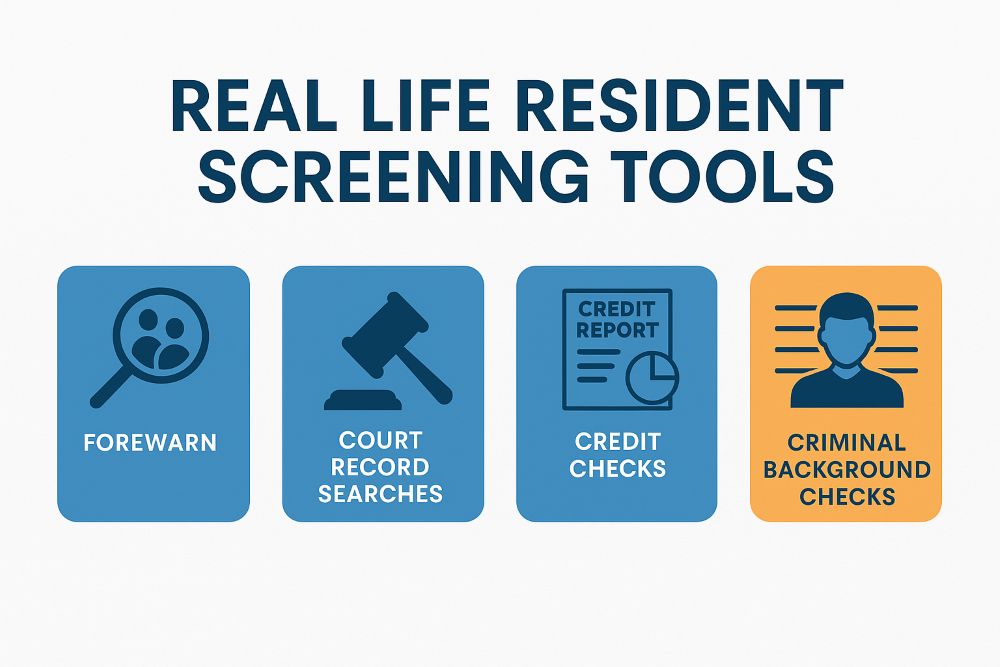When I rented out my 1st rental in 2008, I knew that a solid resident screening is the backbone of a smooth, profitable rental experience. Over the years, I’ve built a reliable toolkit that goes far beyond the basics. This isn’t theory. It’s the system I use every screening to protect my properties, clients, and peace of mind.
This blog is not about how to screen an applicant, what criteria to use, or what we can and cannot do, but rather about summarizing the tools I use, what I do, why they matter, and how to apply them effectively and legally.
1. Forewarn: The Instant Background Snapshot
Forewarn is one of the first tools I use when evaluating an applicant. It’s designed for real estate professionals and offers a real-time background snapshot using just a phone number. It reveals address history, criminal records, bankruptcies, liens, property ownership, and more. It’s fast, efficient, and included in my real estate dues.
While powerful, I treat Forewarn as an early warning system, not a final verdict. If I see something questionable, I use it to guide my follow-up questions or dig deeper through official sources. I simply use it to inform my internal assessment.
It also helps me detect identity fraud or inconsistencies. When someone’s story doesn’t match what Forewarn shows, it’s a signal to pause and verify.
2. Court Record Searches for Evictions and Lawsuits
Even with tools like Forewarn, I always check local court records. In Lake County, Illinois, I use the eCourt portal to look up civil and criminal cases. This helps me identify evictions or judgments that might not show up elsewhere.
Many landlords skip this step, but it’s essential. It’s public data and gives me hard facts about an applicant’s rental history. I verify I’ve got the right person by matching names, birthdates, or addresses.
3. Credit Checks: Financial Responsibility in Focus
A credit report offers a detailed look at how someone manages their financial obligations. I never judge based on a credit score alone, but it is one of my most critical tools. Many companies offer this service. I use TransUnion.
While this tool is powerful, or because it is, you must jump through some hoops to use it. In my case, I had to show my workspace to ensure I had a lockable place to store documents with private information, such as Social Security numbers. Even though pretty much 100% of my applications are digital, and even if I get a paper application, I scan it and shred the original one, I still must go through the process.
Jumping through hoops to use the screening tool is just the beginning. After that, you have to really understand the Fair Credit Reporting Act, or FCRA. FCRA is a federal law in the United States that governs background checks on any individual. This legislation was implemented to promote consumer information and reports’ accuracy, fairness, and privacy. The Federal Trade Commission and the Consumer Financial Protection Bureau oversee enforcement of the FCRA. Any company that uses credit and criminal reports must comply with the FCRA.
This is going to get complicated quickly, so it is recommended that you consult with your legal counsel who is familiar with the FCRA and state/local screening laws to understand your obligations. However, here are some basic guidelines for your obligations under the FCRA:
You must have a permissible purpose for the person you are screening. Under the FCRA, a person or company must have a legal reason, called a permissible purpose, to check a credit or background report. It’s their personal info, and you're not allowed to touch it unless you have a real reason to see it.
Here are some legit reasons someone can check your background or credit:
You applied for an apartment (the landlord wants to know if you pay bills)
You applied for a credit card (the bank checks your credit to approve you)
You are buying a car and getting a loan
You applied for a job, and the employer wants to do a background check
On the other hand, here’s when someone can’t check your report:
A random person is curious about you
An ex wants to spy on you
A business wants to see your info just to decide how to market to you
Those are not allowed and could even be illegal.
The applicant you are screening must have given you written (online/offline) consent to access their credit and criminal data. If you are manually screening a candidate, you must receive written permission from the person who is being screened. We encourage you to ask your legal counsel to review the wording in your online and offline applications to ensure compliance with state and local laws.
Screening reports can only be used to evaluate applicants for one of your properties. You cannot use it for a property you do not manage or for employees/vendors, as this violates the permissible purpose.
Suppose a circumstance requires you to re-screen an applicant (for example, they are moving into another of your properties at the expiration of their current lease). In that case, you need to get written consent again before you perform the new background check. Remember, every screening report must have written consent.
You need to handle rejection properly. Rejecting a candidate who has applied for one of your rentals needs to be handled appropriately to comply with FCRA and Fair Housing laws. Again, we recommend consulting your own legal counsel who is well-versed in the requirements for your state/locale to ensure you handle Adverse Action (i.e., rejecting a candidate) properly. Adverse action is any action you take based on the screening information obtained for an applicant that negatively affects their ability to obtain housing.
4. Criminal Background Checks: Ensuring Safety
Forewarn often surfaces criminal history, but I still run a formal background check through a screening service. This captures nationwide data, sex offender registries, and alias searches. Most of the time, the credit screening company that handles the screening can also do a criminal background check.
5. Photo ID Verification: Avoiding Identity Fraud
I require a government-issued photo ID from every adult (18 or older) applicant. This ensures the person applying is who they say they are and helps me run accurate reports.
I cross-check details like name, birthdate, and address with the application and reports. Starting in 2025, I switched to a new comprehensive screening company, Aptly Screening. While there are many benefits to using this platform, one of the things I like about it is that it requires the applicant to take their selfie photos. It automatically checks to make sure that the ID photo matches the selfie, and it’s done automatically.
Never skip this step. Real applicants won’t object.
6. Proof of Income and Employment Verification
Income verification is a key part of screening. I request recent pay stubs to confirm earnings and consistency. But it’s essential to check that the pay stubs are real. I verify personally (make sure the numbers make sense, etc.) and use the Aptly Screening mentioned above to run a fraud check on the pay stubs (and other documents).
Even if the pay stubs are real, I verify employment by emailing the employer directly for a written confirmation. The tricky part is that some companies use a third-party company, such as The Work Number, a service provided by Equifax that allows authorized users to verify someone’s employment and income information quickly.
Why did I say tricky? First, it’ll cost money. It could be more than the application fee, depending on what you charge for the application fee. Second, you must register with the company because you are looking for private information, which will take time.
If someone is self-employed or has a non-traditional job, I request bank statements, 1099s, and/or tax returns. If they can’t provide real documentation, that’s a red flag.
7. Past Landlord References: Insights from Experience
Talking to previous landlords gives me real-world insight into an applicant’s behavior. I ask targeted questions about payment history, property care, and whether they’d rent to the applicant again.
Not all references are created equal. I’ve encountered fake ones where a friend poses as a landlord. That’s why I cross-verify ownership using property records or company websites. I also watch for red flags, like someone who can’t answer simple questions about the property they supposedly manage.
A strong, genuine reference can be a strong tool, if not the only one.
Final Thoughts: Consistency, Fairness, and Legal Compliance
Every tool in this toolkit works best when used consistently. I apply the same screening process to every applicant to remain fair and fully compliant with fair housing laws.
I recommend that landlords make a checklist: ID, credit score, income verification, background check, landlord references, and court record search. Apply it universally and document everything. This protects you from liability and bias claims.
Being consistent is essential from a fair housing standpoint and prevents you from accidently forgetting to use one or more tools.
Using all these tools can be time-consuming, but the right resident is worth the wait.


